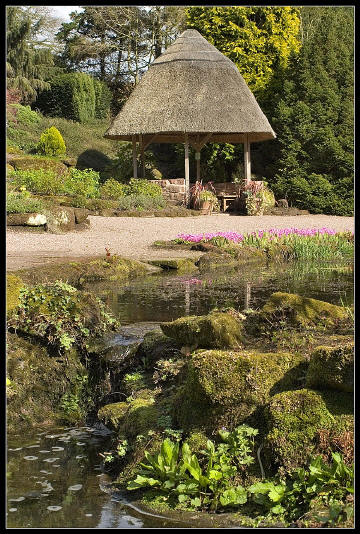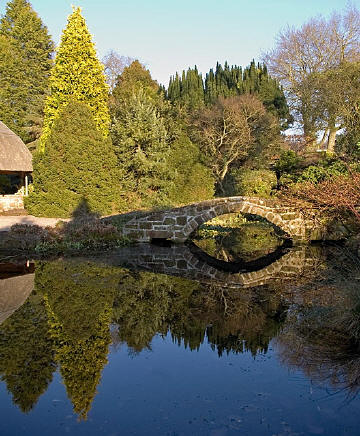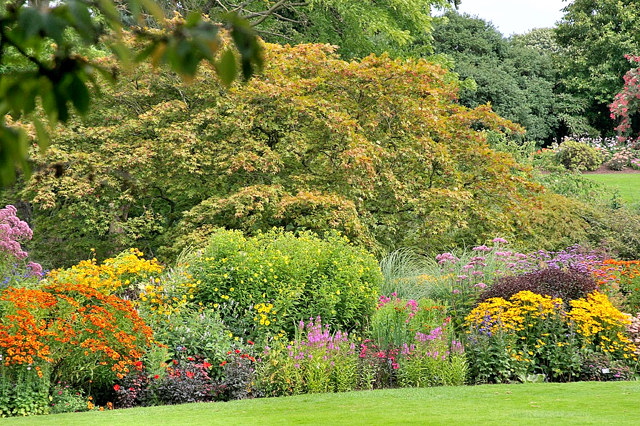Ness Botanic Gardens
Ness, Cheshire
|

Location Guide |
The Gardens are situated on the Wirral
Peninsula, which lies between the Dee and Mersey estuaries, with views across to
North Wales. When the Liverpool cotton merchant Arthur Kilpin Bulley began to
create a garden in 1898, part of which he opened to local residents, he laid the
foundations of one of the major botanic gardens in the UK.
| He sponsored expeditions
to the Far East to collect Himalayan and Chinese mountain plants.
Rhododendron and Camellia being popular. Part of his gardens were
devoted to the propagation of plants and many of the seeds from the Far
East were first cultivated here and where his seed company Bees Ltd
started out. In 1911 the company moved to a 1,000 acre site at Sealand,
near Chester. Bulley died in 1942 and in 1948 the gardens were presented
to the University of Liverpool with an endowment and understanding that
it was kept as a botanic gardens and a specified area of ornamental
ground be open to the public.
Today around 46 acres is the ornamental
garden and shows collections of Rhododendrons, Azaleas, Camellias,
Cherries and Heathers.
Seasonal Highlights include:
Spring and early summer
Rhododendrons and azaleas, camellias, magnolias, cherries and many other
flowering trees and shrubs. Laburnum arch. Large rock garden. Spring bulbs and
primulas.
Summer
Lilies, primulas, herbaceous borders, terrace gardens with many climbing plants.
Native plant, herb and water gardens.
Late summer and autumn
Trees for fruits and autumn colour: Heather garden, Sorbus ( the largest
collection in the country), Maples, water garden and autumn bulbs.
|

 Ruth
Ruth

 |
|
 |
Winter
Wide selection of trees and shrubs with coloured fruits, bark and stems.
Conifers.The gardens are split
into various areas, and has rock, herb, heather and water gardens,
rhododendron borders, pine wood, azalea walk, waterfalls, children's
playing area and viewing points.
Indoor attractions include
All year conservatory, tropical and arid displays.
There is also a visitors centre which is home
to the tea rooms, gift shop, plant sales area, exhibition space, lecture theatre
and main office.
 Keith Patterson
Keith Patterson


|

 Mrs
Magic
Mrs
Magic

|
Location: Ness Botanic Gardens, Nr Neston,
Cheshire |
|
Grid Reference: SJ305756 |
Ceremonial County:
Cheshire
 |
|
Map Link:
StreetMap

|
Aerial photo:
Google Aerial Map
 |
|
Getting there: Between Neston and Burton off
A540. M56 J16 and M53 J4. |
|
Access: 2 car parks next to gardens, on busy
days grass overflow car park 200 metres from Garden Entrance. |
Website:
www.nessgardens.org.uk
 |
Other Useful Websites:
Wiki
 BGCI
BGCI
 Garden Guide
Garden Guide
 Great British Gardens
Great British Gardens
 |
|
Email: nessgdns@liv.ac.uk |
|
Address: Ness Botanic Gardens, Ness, Neston,
South Wirral |
|
Postcode: CH64 4AY |
Telephone: 0151 353 0123 |
Opening Times: Open All Year except 25th and
26th December.
1 Feb to 31 Oct 10am-5pm; 1 Nov
to 31 Jan 10am-4.30pm daily |
|
Charges: Adult £6.50; Child (5-18) £3,
Under 5's FREE; Concessions £5.50; Carers; Free
Family (2+3) £18. Car Parking Free |
|
Nearby Locations: |
Other Location Pages:
Gardens
 |
|
Notes: No dogs, except Guide Dogs
Appropriate footwear and clothing should be
worn, the gardens are undulating and paths may be wet and slippery.
Other facilities on site include café, gift
shop, plant nursery, and the visitor centre with exhibition space.
|
|

|
Please let us know any other information that we
can add to the Further information and Planning Grids or page and any errors that you discover. Before making a long trip to any location it is always
wise to double check the current information, websites like magazines may be
correct at the time the information is written, but things change and it is of
course impossible to double check all entries on a regular basis. If you have
any good photographs that you feel would improve the illustration of this page
then please let us have copies. In referring to this page it is helpful if you
quote the Page Ref at the bottom of the Planning Grid above. To print the
planning grid select it then right click and print the selected area.
Please submit information on locations you discover so
that this system continues to grow.
|